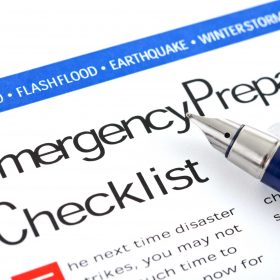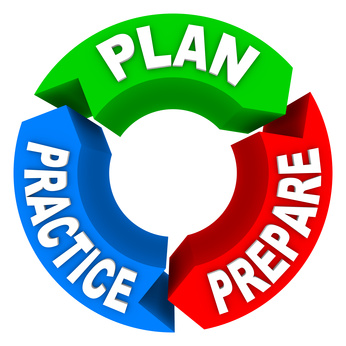Emergency Preparedness: Tools to Help You Stay Organized
In virtually any situation, staying organized can make things much easier. Having an organized emergency preparedness plan and supplies could literally save your life should disaster ever strike.
Here are some tips and tools to help you organize your emergency preparations.
Write Out Your Plan
First of all, you want to organize your thoughts. The best way to do this is to write out your emergency plan. Not only will it help you think it through, but it will also help you crack down on details and get everyone involved on the same page.
Don’t forget to include different scenarios in your plans for emergencies. Make a plan for every situation you can think of: fires, floods, tornadoes, power outages, nearby industrial accidents, and whatever else comes to mind – including anything which is more likely to happen because of the climate in your area (such as snowstorms).
Set That Plan into Motion
Once you have a plan, you can set your plan into motion by making preparations as needed. For example, get all of your survival equipment ready including emergency items in the house, in the car, etc.
Lists for Everything
To keep track of what you have done, what needs to be done, and what or where everything is, never underestimate the usefulness of a detailed list.
Inventory: Keep a running inventory list for your emergency food and water rations, first aid kit, and other supplies. Include expiration dates and make changes to the list as items are used, removed, or replaced. 
Emergency information: Remember to keep a list of medical information, medications, emergency contacts, and any other useful information. Not only will lists like this help you keep everything straight in the chaotic aftermath of a major event, but it will also help emergency services should you be unable to talk.
Specialize a Space
In your car, office, home, and wherever else you might be during a crisis, specialize a space for your emergency supplies. Have a bag in your car or office, and designate a pantry, shelf, or other area at home for emergency water and food rations and other supplies.
Contain It
Especially when storing food, make sure that all items are safely and hygienically contained in airtight bags or containers. Have extra containers on standby for any cans, boxes, or bags that are opened for use. Keep everything as neatly contained as possible so you can keep track of and locate items you need.
Label It
Label all of your supplies clearly. When an emergency occurs, you might not have the time or frame of mind to dig through a mess to look for small items. Also label items with expiration dates and “date opened” so that you can avoid waste and keep supplies fresh.
Maintain It
Save time, money, and trouble by maintaining all of your hard-earned organization. Keep everything as clean as possible, and rotate supplies so nothing is expired when you need it most.
A little organization can go a long way, especially in an emergency situation. You can boost your preparations by following these tips and ideas for organizing your emergency plans and supplies.
Crisis Training and Management
The entire burden for all of this doesn’t need to be on just one person. Each family member should know their assignment, position, and the locations of all other family members in time of crisis. Practice these positions on a regular basis. Everyone, including those that cannot handle a gun, should be trained with a weapon can handle with confidence. For a low budget option, use a squirt gun filled with 75{fa32f3da1db87532d93af57bebf07259016720c780c92cd8735931dd04d79e41} ammonia and aim it at the face and eyes of the intruders. Know when to talk or make noise and when to be completely silent. Be prepared to use all necessary force, including lethal to defend yourself and your family. Keep your bug out bag ready
Pets
Now that you have the humans taken care of what about the pets? Do you have any, are you taking them or leaving them behind? You should never leave them behind! Who will be in charge of prepping for them, food, water, medicines, ice chest, vet records, pictures in case you get separated, leash, crates for containing them.
Remember plan ahead, evacuate early, always take your pets, and practice your plan.











Leave a reply